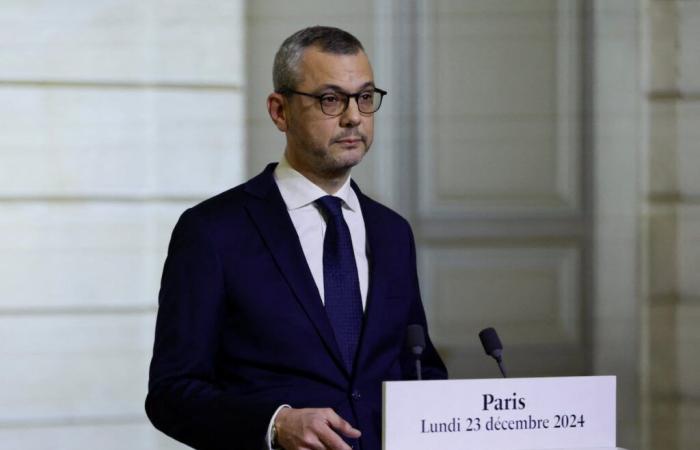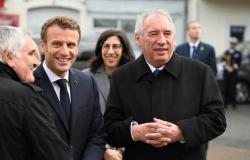
France already has a new Government. Prime Minister François Bayrou promised it “before Christmas” and has delivered, although barely. Just over a week after his appointment, the Elysée announced this Monday the composition of the new Executive, of a continuing and conservative nature that incorporates some previously prominent figures in French politics. However, his future looks uncertain even though he has not yet taken his first steps.
Among the members of this Government, which will assume the reins of a country in the midst of a political blockade due mainly to the Budgets for 2025, is former Prime Minister Manuel Valls as Minister of Overseas. This is a portfolio that has gained relevance due to the crises that have broken out in different peripheral territories of France (the most recent, the cyclone that affected the island of Mayotte, but also the riots in New Caledonia and the protests in Martinique over the rising cost of living) and that will prompt the Government to pay more attention to them. In the Economy portfolio, the president, Emmanuel Macron, has innovated by appointing banker Éric Lombard as Minister of Economy.
Bayrou's cabinet retains Bruno Retailleau, representative of the hardest wing of the French right, as head of the Ministry of the Interior. The member of The Republicans (LR) held this portfolio in the previous Executive, under Prime Minister Michel Barnier, in a clear attempt to please the National Rally (RN) of Marine Le Pen. This peace offering was of little use, despite which Barnier and his ministers received a motion of censure on December 4.
The composition of Bayrou, 73 years old and leader of the center-right Democratic Movement party (MoDem), maintains the same political base and does not include any representative now proposed by the left, despite the attempts of the head of the Executive to approach him. Even so, there are two figures of socialist origin: François Rebsamen, Minister of Decentralization, and Manuel Valls himself, who was prime minister during the first stage of François Hollande's presidency. It remains to be seen if the opposition is satisfied for the moment with the appointments or if, on the contrary, it is beginning to strategize a motion of no confidence, a threat mentioned in recent days by some forces.
France has been mired in a political crisis since June, when President Macron announced the dissolution of the National Assembly and called elections after the disastrous results obtained in the European elections. The legislative elections resulted in the victory of the left-wing alliance New Popular Front (NFP), but the lower House of Parliament was fragmented into three irreconcilable blocks without a clear majority—the left, the center-right and the extreme right—which gave rise to to a fragile Government that barely lasted three months, the shortest of the Fifth Republic.
Despite the failure of the Barnier Executive, fallen at the initiative of Jean-Luc Mélenchon's radical left party La France Insoumise (LFI) and thanks to the support of RN, Bayrou has preserved part of the configuration of his predecessor.
Upon his arrival in office, the prime minister showed signs of greater openness, reaching out to both the right and the moderate left, holding meetings with the heads of the different political forces – excluding LFI and RN – and consulting regularly with Macron.
Some were not, however, very impressed with his ideas and promises. “We are dismayed by the poverty of what has been proposed,” declared the leader of the Socialist Party (PS), Olivier Faure, on Thursday, ensuring that his party has not yet found “any reason not to censure” the head of the Government.
In the absence of a clear political line due to lack of majority, Bayrou had set himself the goal of surrounding himself with heavyweights. In addition to Bruno Retailleau, a great figure of LR – the traditional right-wing heir to Gaullism – and popular among the extreme right thanks to his firm commitment to the fight against irregular immigration, the Government will have better-known names such as former Prime Minister Élisabeth Borne in the Education portfolio now Jean-Noel Barrot in Outdoors.
Xavier Bertrand, another of the most recognizable personalities in French politics and protagonist of a long history of mutual dislike with RN, will finally not be part of the Executive, a clear sign that Marine Le Pen's party continues to largely condition the French Government. .
Economy Portfolio
The great unknown of this new cabinet was undoubtedly centered on who would lead the Ministry of Economy. Finally, the banker Éric Lombard will be in charge of this portfolio, a position that was highly desired until a few months ago, but which is now perceived as an almost impossible challenge to manage.
France has a long and thorny path to follow to straighten out its accounts. According to estimates by the National Institute of Statistics (INSEE, for its acronym in French), public debt reached 3.3 trillion euros in the third quarter of 2024, that is, 113.7% of GDP. And the country's public deficit will almost certainly exceed 6% of GDP this year. To rectify the situation, the Government of former Prime Minister Michel Barnier calculated that the State had to make an adjustment of 60,000 million euros, between spending cuts and tax increases. The Budgets that he presented accordingly, and that he tried to approve by decree in the face of opposition from the left and the extreme right, ended his legislature.
The fall of Barnier and the subsequent appointment of Bayrou have also raised doubts among investors. The proof is that the Moody's agency lowered the reliability of the second economy of the European Union, placing its sovereign rating at Aa3 with a stable outlook, calling into question the Government's ability to “implement measures that avoid budget deficits larger than expected.” .
For now, a “special law” prevents the State and Social Security from being left without the capacity to act as of January 1, 2025, but it cannot replace the Budget for next year. Guest on the public channel France 2 on December 19, Bayrou indicated his intention to present it “in mid-February.”
Setbacks and low popularity
In this climate of political uncertainty, the same question will undoubtedly hover over Christmas Eve dinners in France this year: how long will the new Government last?
The first days in office of François Bayrou, whose appointment on December 13 was accompanied by a sense of improvisation, have been complex. In addition to the arduous task of forming an Executive that lasts beyond a few months, the prime minister has added several setbacks that have raised doubts about his leadership capacity.
Just one day after his appointment, Bayrou encountered a serious crisis in the French archipelago of Mayotte, located in the Indian Ocean and devastated by Cyclone Chido. The head of Government, who maintains his position as mayor of Pau, decided to preside over the municipal plenary session of this city, located in the southwest of France, on the same day that a crisis meeting was held to respond to the emergency situation in the overseas territory, which he participated by videoconference.
The next day, during the Government control session, Bayrou justified not having traveled to Mayotte, ensuring that “it is not mandatory for the Prime Minister and the President of the Republic to leave the national territory at the same time.” The response did not take long to arrive and the entire French political spectrum reminded him that the archipelago is part of the country. “Bayrou's Advent calendar gives them a scandal every day,” ironically RN deputy Guillaume Bigot. According to a survey by the Ifop institute for the Sunday newspaper published on Sunday, only 34% of the people surveyed are satisfied or very satisfied with the current head of Government.





